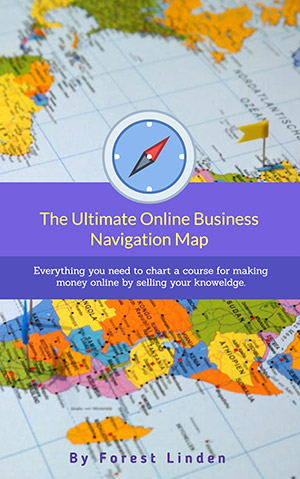The 11 Principles That Help Me Answer Every Business Question

I’ve had my head in the internet marketing world since 2007, studying, watching, and learning. Back then, selling digital knowledge products, like online courses, was a novel business model.
In the years since, I’ve experimented with many methods to create businesses (some that I created alone and another that I ran with my wife), that make great money while also helping people make positive changes in their lives. Some of those methods I learned from online teachers and others were the result of experimenting.
Three of those businesses became six-figure businesses, and one has made over $3 million so far (in total sales, not net profit.)
To reach those numbers, we’ve steered clear of as many smarmy internet marketing and sales tactics as we could. You know, like the shady, fake urgency triggers that many online marketers use: “Only 97 seats left in the course! Sign up by Sunday at Midnight before $15,000 worth of bonuses disappear forever!” (Wait, aren’t you selling an ebook? How are there only 97 seats left…for an ebook?)
Many of those tactics can work, but the problem for most of us is that they usually feel 100% out of alignment with who we are and how we want to run our businesses.
If the only way to make money online by selling knowledge products is to use old-school, aggressive, ethically questionable, icky, shady, deceptive, used-car salesman marketing tactics, then I would have said “thank you, next” a long time ago.

Thankfully, there are other ways to market and sell things like online courses, ebooks, monthly memberships, coaching, and consulting. There are ways to build the type of business you’re aiming for, and the kind of lifestyle that can come with it, that involve treating people with respect and kindness, rather than merely pressing their unconsious buttons to get them to buy your stuff, simply because you know how to push those buttons.
Below are 11 principles that guide every single business decision I make, like how to do marketing, how to launch online courses, how to write sales pages, how to increase affiliate revenue, how to sign up more clients in free discovery calls, how to approach customer support, and what to drink before I start work in the morning. (I’m kidding. I don’t need a principle for that, because, coffee.)
It seems like every week that goes by, we’re all faced with questions and decisions in our businesses:
- What should I teach in my webinar?
- How much time should I spend talking about my online course at the end of the webinar?
- Should I post a selfie from our family adventure this past weekend, or should I tell a story about how one of my students had a big win last week?
- Should I put a countdown timer on the sales page for my course, or…no?
- Should I send out a blog post this week, or can I skip a week and focus on creating my course content?
We’re faced with so many questions. Every. Single. Week. Having a mentor that you can get support from for the journey can be a great help, but it can be even better to have some foundational principles stored somewhere, either in a notebook or in your mind.
Principles that can quickly help you make strategic and tactical decisions, or even lead you to create new ways to market and sell your products and services.
I’ve used the principles below all over the place in multiple businesses, both consciously and unconsciously. They work. Even when you don’t do them on purpose. Actually, they work especially well when you don’t do them on purpose, meaning, when they become a way of being for you, and you don’t even think about them…you just are this way with your customers.
These principles have led me to create marketing and sales strategies that not only feel better to employ, but that can generate a lot of money. And with the type of business you’re likely creating, if you’re making more money, you’re making a bigger impact in the world.
Last thing, and then I’ll stop with the preamble: I didn’t invent these principles. If anything, I stumbled over them in what often feels like the uncharted wilderness of online business. (“Mama, why is Papa curled up on the floor with a bloody shin?”….” I’m not totally sure, but I think he just discovered a new business principle.”)
If you study online marketing, copywriting, or business books, you’ll likely recognize some of these principles.
Many of them just emerged as a way of being for me, or a way of being that I watch my wife do in her business, and then later I found out that these ways of being are part of various thought leader’s frameworks for things like writing sales pages or strategies for launching an online course. (And often, those frameworks are built on advertising principles discovered by Claude Hopkins, back in the late 1800s. Everything always goes back to Claude Hopkins.)
Alright, let’s go…
11 Principles to Create An Ethical, Successful Business
1. Always look for ways to help people.
There are a lot of problems in the world. People in your target market have their own set of challenges and things they’d like to improve in their lives.
If you come from a place of genuine compassion, of wanting to help the people in your market make changes in their lives that will make their lives better, and then you actually deliver on your promises? You will never be short on money.
2. Be an authentic, transparent, kind person.
The more that everything online becomes automated and removed from personal, human contact, the more people will crave authenticity and transparency.
If you can find ways to be yourself, to be authentic with the people in your audience, and to simply just be a good person, you will almost instantly stand out from your competition.
People will talk about you and what you’re doing because being authentic and kind are becoming increasingly rare (unfortunately.)
3. Put your prospect’s need to solve a problem above your need to make a sale.
Yes, you have to make revenue to take care of yourself and your family. You need money to keep your business running. But that will come if you can put the needs of your customers above your own need to make money. I promise.
You may lose some sales along the way. A prospect may not be the best fit for you to work with. A customer might not resonate with your online course content and might ask for a refund.
Those situations will be rare, but you have to be willing to lose some sales to make many more.
Ask yourself what would be best for any given prospect or customer, even if the answer is to refer them to one of your competitors.
4. Find and use your NO.
Be committed to maintaining the integrity of you and your business to the point where you’re willing to say “no” to working with a client, or keeping a person in your online course if they aren’t a good fit.
If you have an online community space as part of any of your offers, like a private Facebook group, be crystal clear about the values you hold, about the culture you want to create, and how you and others in the community should be treated. And when someone crosses the line, defend it with an appropriate level of clarity and passion. Defend it with your Sword of No.
5. Tell stories about change.
The power of stories cannot be overstated. Use them wherever you can.
Tell stories of how working with you allowed one of your customers to transform their life, or how your online course took them on a journey from one state of being into another.
People in your market want to solve a problem. They want to make something in their life better. Tell them stories, from your own life and from the lives of others, about the kind of change they seek. Show them how other people have made the kind of changes they’re looking for with the help of your products and services.
Paint the picture of a better future for them, how their life can be after they go through your program, or after they get coaching from you, or buy your book.
6. Address objections.
Address the common objections that you know most people will be thinking about before they buy something from you.
Hiding things won’t work. Remember: openness and transparency.
If you’ve heard many of your prospects bring up hesitations in free discovery calls, or write about them in emails or social media comments, bring them up on your own in discovery calls, emails, chats, or on your sales pages.
People will feel like you really get them, which leads me to…
7. Understand the people in your audience until you can see them deeply.
People want to be seen and understood. They want to be heard. They want someone to get them, to understand their problems and challenges so well that they can listen to you speak them, or write about them on your website, in a way that feels like you’re speaking their own thoughts.
Continuously work on listening to and deeply understanding the people in your audience. What drives them? What keeps them up at night? What do they really care about? What do they complain about when they use your competitor’s products? What makes them decide to buy one online course over another? What frustrates the hell out of them? What do you overhear them yearning for in cafe conversations?
Know them through and through, far beyond meaningless demographics of age, income level, marital status, and location. Inhabit their worldview and see the world as they do.
8. Show people the bad things you can help them avoid.
The people in your market don’t just want to make a change that will make their lives better. They also want to avoid things that will make their lives worse.
Paint the picture for prospects of the unfortunate, frustrating, painful situations they will be able to avoid if they buy your products, your online courses, or your services. Explain these things in their own language, their own voice, and show them how you and your products can help them avoid those things.
9. Show proof that you know what you’re doing.
Before prospects become customers of yours, they’ll look for signals that indicate that you’re the real deal, that you know what you’re talking about, and that you know what you’re doing.
Find ways to demonstrate that you can, and have, delivered the benefits you’re communicating to them in any of your marketing content.
10. Find ways to give away free help.
Be generous. Give your help freely. Give away more than you think you should. Be the one to show up at the party with free pizza, not the guy trying to sell insurance in the corner.
Give away free ebooks, free email courses, free short videos, free webinars, free podcasts, blog posts, Youtube videos, or an entire free content library.
When you’re trying to get people to take action to sign up for something like a paid online course, add on more free things on top of the course. Free mini-courses, free email templates, free consulting sessions, a free copy of your published book, free doughnuts. Get creative!
The goal is to help people in your target audience to make a change in their lives. As much as possible, help them make that change for free. It will endear them to you. They will tell their friends about your free things if you create them in a way that actually helps people make some kind of positive change in their lives.
Word of mouth is your friend. Your audience will grow, and many of them will pay for your more in-depth help and support available in your paid products and services.
But here’s the trick: you can’t give away free help just because you want to get more money. It doesn’t work like that.
You have to give your free things away because you honestly want to help people for free, without any expectations that you’ll get something in return.
11. Create authentic urgency.
Most people often put off spending money until the very last possible minute. (If you’ve ever launched anything like an online course with an open/close period of registration, you’ll know that 80% to 90% of your sales will happen in the last 24 hours before your registration closes. We humans don’t part easily with our money.) If you don’t give people a real, genuine reason why they should buy your product or service now, most of them will put off the purchase until later. Only…later may never come.
You’re up against human nature here, and there’s really no way around it. You’ll have to create tension (a reason to buy your product now, rather than later,) to get a sustainable amount of money to come in from selling your knowledge.
There are ways to do this without being aggressive and without being an icky online marketer. You don’t need countdown timers on your sales page. You don’t need to send 6 emails in the last 4 hours of your launch telling people that registration for your course ends tonight at midnight. There are other ways. Gentler ways. Respectful ways.

How you go about expressing the above principles in your own business is where the fun happens. There are many ways that I’ve implemented these principles and many ways I’ve seen others implement them. (I help people learn and create their own versions of those ways in my one-on-one strategy sessions.)
The power in these principles comes, however, from giving you the freedom to create your own unique approaches to living out these principles in your business.
People like me can show you some examples, then you can try them out, adapt them, experiment with them, and ultimately create a never-before-seen way to express these principles, which, in the end, will likely result in you having the kind of income and impact you’ve been dreaming of.
I hope this has helped you in some way, and no…I’m not just saying that because I’m trying to do one of these principles. I mean it. For reals.
Okay, I’m off to head back out in the wilderness and hope that I trip over some more principles, because I have a feeling there are a few more that I haven’t been able to put words to yet.
All the best to you,
~Forest


Nice principles. Countdown timers, fake webinars, hero’s journey? Nah, you can keep all that mr internet marketing guru. When I’m stuck deciding what to do I simply ask “What’s in the best interest for my client?”. If I can deliver that while still taking my business in the right direction then that’s the thing to do.